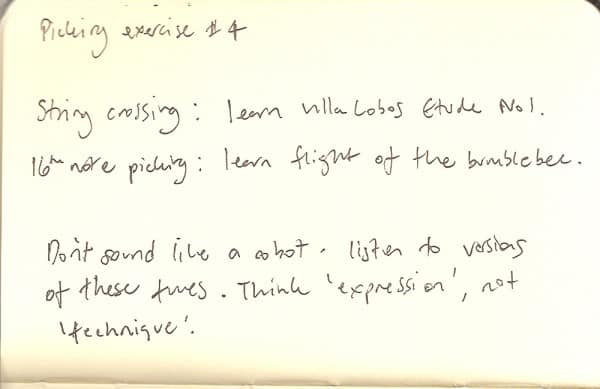If I want to work on a certain aspect of my playing, I try to learn an actual piece of music that’ll help.
E.g., if I want my playing to be more rhythmic, I’ll learn some rhythmic music, rather than practising rhythmic permutations. That’s my first port of call. If I’m still not satisfied, I’ll try something else; maybe that’ll be maths and thinking, but you get the idea.
Music first; exercises last :)
Anyhow, if you want to work on your picking, I suggest you learn this:
Villa-Lobos Etude No.1
It’s an actual piece of music!
Hooray!
If you pick it (alternate or hybrid), then it offers many challenges: string crossing, outside-picking (if you start on a downstroke), inside picking (if you start on an upstroke), stamina, it’s been played by every classical guitarist so there are many ways to hear it played, and so on.
But, I think the biggest challenge with this piece is that if you play it metronomically, then it’s an awful piece of music!
The Challenge
So the challenge is how to be expressive with it – how to turn that tedious descending diminished section into something worth listening to.
If you play it like a robot, then it’s just teeth-grindingly absurd.
And yet, there are gazillions of versions of it everywhere.
Every classical guitarist knows it. So figure out how they make it sound good.
Bumble-Bee
Same thing with Flight of the Bumble-Bee.
Don’t play it to a metronome.
Listen to this and try to be that expressive with it.
Feel free to add your additions to this (at present) two-page book of technical challenges. In particular, how to approach a certain piece? what challenges lie waiting? … … …

I get you.
Cheers Mike :)
I was sort of kidding. But the point was, like you say, all the elements of music are there in pieces of music, so learn tons of music. Sometimes you do have to do things that can’t be addressed by learning a piece, like when you need to learn the notes on the fretboard. Anyhow, the main point is that whatever you’re working on, picking or whatever, it should serve the music you’re trying to make, not the technique, which is the trap you can get into if it’s all metronomes and things you’ll never use. And that stuff is easily teachable, looks nice on handouts, but that’s another rant entirely…
Thanks for pointing me to those clips, I think they’re brilliant.
Oh dear…I’m sorry. I just read back my comment, and yes, for some reason, I’ve only just now, today, come to that realisation.
I don’t think he has released the notated music, but that one on the link, is played on the new Gary Burton Quartet album, you can hear it in the background here http://www.youtube.com/watch?v=30L72Z7EjSQ&feature=relmfu
You mean, if you learn some music you’ll get better at music? ;)
re the vid: Julian Lage is fantastic, yes. Interesting etudes also. Great of him to make those. Are they out in a book or something?
I really like the idea of this, though I don’t do it as much as I feel I should. Since if you develop a technique within a musical context, you are specifically striving for the best combination of dynamics, tone, rhythmic accuracy etc, within that particular moment of music. And surely that must really do wonders for your awareness and judgement within an improvised context for example, as you’re conscious or sub-conscious can match up the feeling of the music with technique.
Also have you checked out this guy? http://www.youtube.com/watch?v=SdedBrenPsk